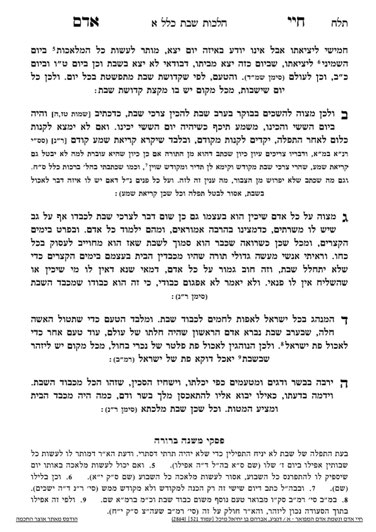We have finished siman 5, where the Chayei Adam discussed sharpening knives for Shabbos. We mentioned one reason is to prevent disagreements and increase shalom bayis. We know that Chazal were concerned with increasing shalom bayis on Shabbos as much as possible. The Gemara says there were two reasons for the takana of neiros Shabbos, one of them because of shalom bayis. If the house is dark, people tend to trip and not be in a good mood. (The second reason is because of oneg Shabbos, that one tends to enjoy their food more if they can see it.) The chiyuv of shalom bayis requires that one ensure there are candles lit throughout the house. We will learn more about these halachos when we get up to them, be’ezras Hashem.
The Chayei Adam continues, and writes that a person should prepare for Shabbos as though they are greeting a special guest, the Shabbos queen. In siman 262, the Shulchan Aruch writes that a person should wear nice clothing and be excited about Shabbos coming, as though they are greeting a king. The Mishnah Berurah expands on this, and writes that the Zohar and kabbalists write strong admonitions against getting into any fights on Shabbos. The Zohar learns that when it says in our parsha (Vayakhel) lo se’va’aru eish, not to light fire on Shabbos, it can be understood to mean that should must take care not to light any machlokes, which is comparable to fire, on Shabbos. Shalom bayis is something which is very precious to Chazal.
The Chida says that erev Shabbos is a time in which people are in danger of getting into machlokes due the pressures of time and the need to get everything ready. A person should be careful not to let that happen.
The Sefer Kaf Hachaim was written by Rav Chaim Palagi, a dayan and rav in Izmir, Turkey, in the 1800’s. He quotes the Chida, and writes that he has seen time and time again that when there is disagreement within a family on a Friday night, sometime in the coming week there is something negative which befalls that family.
Chazal tell us that when a person is asking questions of their family on erev Shabbos to ensure that the Shabbos preparations are completed, they must ask the questions with a modulated voice, and do it in a way that is gentle and avoids pressure and machlokes.
As much as we know that machlokes and shalom bayis can be issues throughout the week, we see that it is much more of an issue on erev Shabbos. The Mishnah Berurah points out that if one is excited for the special guest which is coming–the Shabbos queen–they will be in a state of simcha and hopefully be in less of a state of machlokes and discord. The Mishnah Berurah combines these two ideas, that by sharpening the knives on the one hand (and any other actions to mitigate potential quibbling) and being excited for the Shabbos queen on the other, one will be in a better frame of mind and less likely to get into machlokes.
Summary
One must be careful to avoid machlokes and discord on erev Shabbos. Sharpening the knives, making sure the house is well lit, and being excited for the Shabbos queen are ways that one should to try to be in a better frame of mind so that they avoid machokes.



